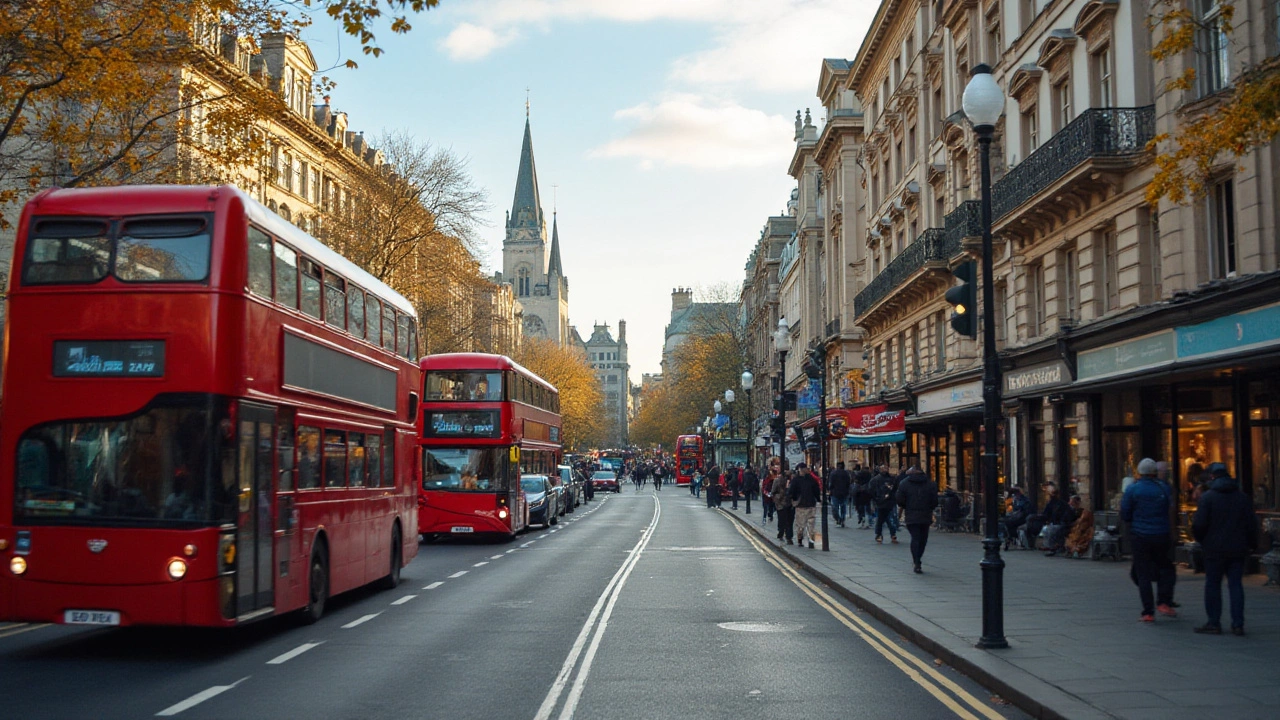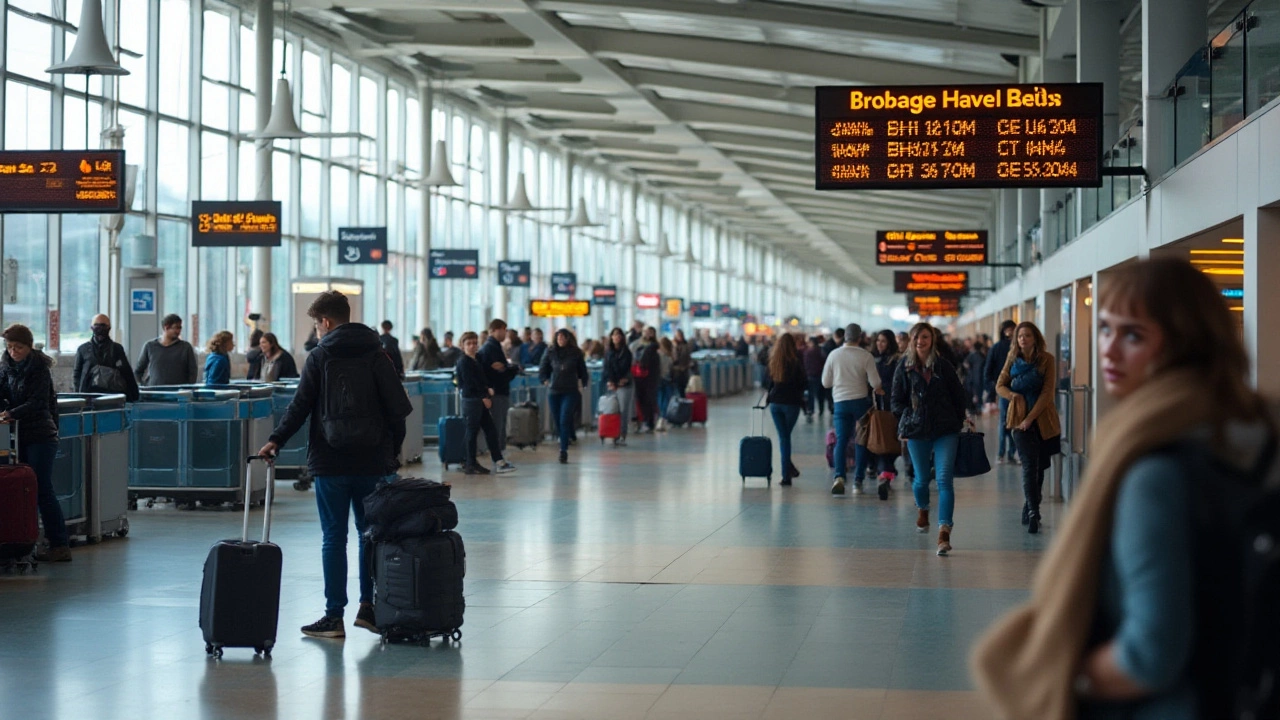Traveling during the holidays can often seem like an expensive endeavor, yet there exists a secret that seasoned travelers know all too well: not all holiday months demand the same from your wallet. If you've ever wondered when is the best time to plan a cost-effective getaway, you're in for a helpful reveal.
Delving into the strategies of off-peak travel can reveal months that are surprisingly light on the budget. Knowing when to book your flight or reserve that charming cottage by the sea can make all the difference in creating a memorable, yet affordable adventure.
This article journeys into the world of holiday deals and uncovers which months offer travelers the most savings. You'll learn insider tips on how to stretch your travel dollar and find joy in holidaying away from the usual peak crowds. Get ready to turn the idea of a 'cheap holiday' into an exciting and attainable reality.
- The Science Behind Off-Peak Travel
- Months that Offer the Best Deals
- Tips for Scoring the Best Prices
- Maximizing Enjoyment on a Budget
The Science Behind Off-Peak Travel
Have you ever wondered why some travel dates tug less forcefully at your purse strings? The art of cheap travel largely hinges on understanding the rhythmic dance of demand and supply in the tourism industry. During certain times of the year, tourist destinations experience what's known as the 'off-peak' season. This is when fewer travelers journey to these locales, leading to dramatically reduced prices on everything from flights to accommodations. But what exactly triggers this phenomenon, and how can a savvy traveler take full advantage of it?
At its core, the principle of off-peak travel is rooted in basic economics. When demand for travel is low, airlines and hotels are more likely to offer discounts to attract customers. This low demand often coincides with school schedules and weather patterns, which means that locations might be less crowded, offering a more relaxed vacation experience. In business terms, it's like a clearance sale, except what you're buying is an experience and not just a product to shelve at home.
One fascinating aspect of this dynamic is how it influences different regions in distinct ways. For instance, the Caribbean islands might see a drop in tourism during the hurricane season, incentivizing resorts to lower their rates significantly. Europe, on the other hand, sees a lull in tourism in the shoulder months of autumn and early spring. During these times, you'll find that the usual hustle and bustle of tourists in cities like Paris or Rome is replaced by a more tranquil pace, yet all major attractions remain accessible.
Carl Jones, a travel economist at the Travel Institute, notes: "The trick is to think like a local. Locals are privy to these seasonal ebbs and flows. They understand that true beauty isn't marred by a little rain or cooler temperatures. By adopting this mindset, travelers can enjoy premium experiences at bargain rates."
The savvy traveler eyeing a budget-friendly adventure should immerse themselves in data regarding seasonal trends and traveler behavior. Various travel platforms now provide historical data insights, showcasing pricing trends and offering predictive analytics that pinpoint the best time for your vacation. By timing your trip to coincide with these off-peak periods, you'll often find the holiday deals more generous, while the destinations themselves are more enchanting without the throngs of tourists.
Consider the interplay between off-peak timing and destination choice. Popular summer retreats, such as the Mediterranean beaches, are optimal to visit as temperatures mellow in September. This notion is echoed with winter destinations too. Ski resorts, for example, drop their prices as soon as the Christmas rush wanes in January. This phase not only blesses visitors with a heavier snowfall but also emptier slopes, enhancing the skiing experience manifold.

Months that Offer the Best Deals
Planning a holiday on a budget involves understanding when flight prices and hotel rates dip significantly. Often, the best deals are available during off-peak travel times, periods not coinciding with school vacations or major holidays. For instance, January typically sees a slump in travel activity. Right after the holiday rush of December, airlines and hotels drop prices to attract more bookings. Travelers who venture out during this month often find destinations less crowded, making sightseeing more relaxed, which can be particularly appealing after the high energy of the festive season.
Another prime time for travel savings is May. As spring temps rise, but before summer vacation kicks in, costs tend to be lower. This month is ideal for exploring European cities before tourists from all over swarm the streets. Trekking in Asia or seeing the ancient ruins is often more enjoyable when done with a cooling breeze and lighter crowds. Research indicates that traveling in May can save you up to 30% compared to peak season prices. It's the sweet spot between winter blues and the summer heat -- a savvy time for bargain hunters to indulge their travel passions.
September, too, holds its charm. Known as the budget-friendly month in many travel circles, it marks the time when kids return to school. Parents get strapped back into regular routines, making tourist spots much less hectic. Often, destinations host end-of-season festivals, providing an opportunity for cultural immersion without the hefty price tags associated with peak times. In many regions, the weather remains favorable, ensuring enjoyable outdoor excursions. According to travel experts, booking in September can yield savings of up to 20% on both flights and accommodations. A representative from Travel Deals Magazine was quoted saying, "Booking September travel means accessing some of the year's top bargains."
Of course, timing your travel deals involves a regional aspect too. Destinations in the Southern Hemisphere may offer better rates during their own off-seasons, like March or October. Take advantage of contrasting seasonal trends between hemispheres to capitalize on unique, budget-friendly travel experiences.

Tips for Scoring the Best Prices
Finding the best deals requires a blend of timing, flexibility, and a keen eye for discounts. To start, knowing when to book your travel can save you a significant amount. Studies on airfare trends consistently highlight the importance of booking flights two to three months in advance for domestic trips and up to six months ahead for international travel. This timeline helps you catch the best fares before any last-minute surges occur. Meanwhile, keeping an eye out for flash sales from airlines or travel websites can yield unexpected savings. Signing up for newsletters from airlines or popular travel platforms can provide you early access to these promotions. You might be surprised how often surprise sales pop up, providing discounts ranging from 10% to 50% off.
Another strategy involves being flexible with your travel dates. Most people aim to travel on weekends or during the same peak holiday weeks, but opting for mid-week travel can be a game changer. Tuesdays and Wednesdays typically offer lower fares owing to reduced demand. Similarly, embarking on a trip shortly before or after a major holiday can allow you to experience popular destinations without the crowd — and the costs they bring. An insightful approach is to use flexible date search tools available on many booking websites. These tools allow you to scan a broader range of dates to spot the cheapest days to travel.
Lodging is another significant expense where you can make savings. Consider alternatives to traditional hotels, such as staying in a rented apartment or trying out a hostel for a unique experience. Often, rentals or alternative accommodations come equipped with kitchen facilities, letting you save on food costs, which can quickly add up. Platforms like Airbnb or local vacation rental services offer a wide range of choices that can be more affordable than typical hotel stays, especially when traveling with a group. Always remember to read reviews and check ratings to ensure the legitimacy and comfort of these places.
Utilizing credit card rewards and loyalty programs can also significantly cut down on your travel costs. Many credit cards offer travel points or miles as incentives for each dollar spent. By using these strategically, you can earn enough points to cover flights, accommodations, or even car rentals. Loyalty programs offered by airlines and hotels also reward frequent customers with discounts or upgrades. Signing up for these, often free, programs can lead to desirable perks, especially if you are a regular traveler.
According to a report from a well-known travel agency, 'Loyalty programs not only enhance your travel experience but also make it affordable by providing privileges and flexible options that you might overlook otherwise.'
Finally, don't overlook the power of negotiation and direct booking. Contacting a hotel directly sometimes secures a better deal than booking through a third-party site. Similarly, asking for discounts when booking over the phone or through chat can yield surprising results, as hotels may have unpublished specials. Make a habit of comparing prices across multiple platforms to ensure you're getting the best deal. Implementing these strategies doesn't just save you money, they also enhance your entire travel experience, making it possible for you to indulge a little more in destination activities or dining experiences.

Maximizing Enjoyment on a Budget
When traveling on a budget, the goal is to experience as much as possible without overextending your finances. This can be achieved by adopting a few savvy strategies that allow you to stretch your dollars further while still indulging in the joys of holidaying. One effective way is to embrace the local culture, which can provide authentic experiences often missed by those sticking to pricey tourist traps. For instance, instead of dining at upscale restaurants aimed at tourists, explore local markets and street food vendors. Not only does this offer insight into the local way of life, but it often comes at a fraction of the cost. Additionally, visiting museums or attractions on free entry days or during discounted hours can also contribute to substantial savings. Many cities offer free walking tours, where you can soak in the local history and culture, guided by enthusiastic locals who work for tips, allowing you to set your own budget.
Another important aspect of budget travel is the accommodation. Opting for hostels, budget hotels, or even short-term rentals can often save you a significant amount compared to traditional hotels. Beyond just choosing the cheapest room, consider places that offer amenities like free breakfast, Wi-Fi, or kitchen facilities. This not only saves money on food but also allows you to cook and share meals if you're traveling with a group. Using public transportation, renting bicycles, or simply walking can also cut down on transit expenses while giving you a new way to experience the destination. Public transport passes or tourist cards often offer discounted rates or combined entries to popular attractions. Budget-friendly travel often means getting a bit creative. Engage in activities that are easy on your wallet, like hiking trails, beach days, or community events. Local festivals and open-air concerts can provide entertainment and an opportunity to mingle with residents and fellow travelers alike. Even checking community boards and social media groups can reveal unique, budget-friendly events like free outdoor yoga sessions or art shows.
Let's touch on planning ahead—another key element to maximizing enjoyment on a budget. Keeping an eye on airfare and accommodation deals can produce substantial savings. Alert systems offered by travel websites can notify when prices drop, allowing you to book at the lowest rate possible. Plan activities around happy hour times in bars and restaurants, or lunch time menus known as 'prix fixe' meals to indulge without splurging. Pre-book popular attractions online instead of at the entrance which might offer not only discounts but also skip-the-line privileges.
"Travel is the only thing you buy that makes you richer," so goes the saying. By being mindful of expenses and prioritizing meaningful experiences over material possessions, your travels can indeed enrich you. This mindset is echoed by Pauline Frommer, who advises travelers to spend on experiences rather than things, famously stating, "Memories are the best souvenirs."Remember, it's the personal connections and unique experiences that linger with you long after the holiday is over, not how much you spent. By thoughtfully planning and making informed choices, you can enhance your travel experiences remarkably while staying within your budget. And who knows, the skills you hone while budget traveling might just translate into better financial habits at home, leaving more room for future adventures.
